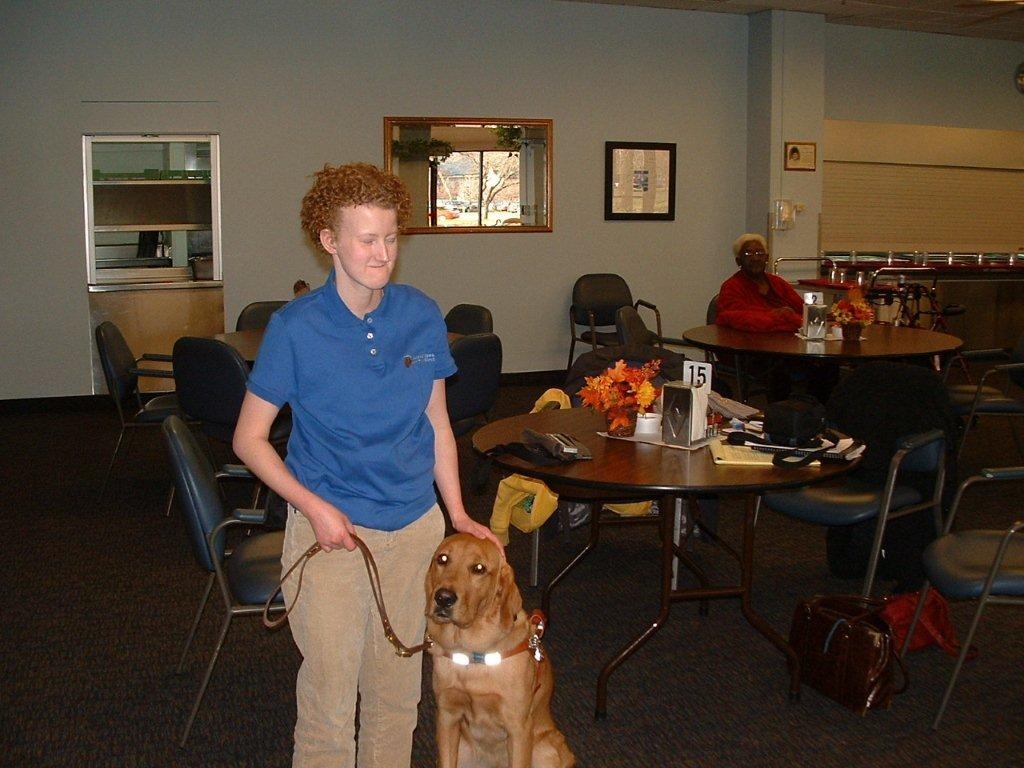Jen’s life includes the usual challenges that people encounter, in addition to the fact that she is blind and deaf. And while she calls her lack of sight and hearing a disability, she doesn’t let it deter her in the least. “I can do anything,” she says confidently.
She grew up near St. Louis, moving to Peoria some two years ago. Her brother Dan, who lives in Kentucky, also has severe hearing loss and is legally blind. Her parents can see and hear. The cause of deafness and blindness in Jen and Dan is not certain, but is likely genetic as both parents are carriers of a gene for a yet unnamed disease.
“I was mainstreamed till 8th grade,” says Jen, “and I attended different grade schools. After 8th grade, I took high school through correspondence, mainly through the mail from Hadley School for the Blind. Their office is in Chicago. I later went to school in Chicago, (ICRE-Wood, an educational program through the Department of Human Services for adults who are visually impaired to assist them in achieving independence) to learn about living independently.”
Last fall she was at Guiding Eyes for the Blind in Yorktown Heights, New York to train for a guide dog. Now her constant companion is Farley, a 2 ½ year old Golden Lab mix. She says the training with her dog was very difficult. She was previously trained in using a cane, a requirement before she could have a guide dog.
Jen lived at home for some 20 years and with her grandmother for a couple of years. She came to Peoria because she has friends here and wanted to live on her own. Apartment living suits her very well, and she and Farley have adapted quite comfortably. Concerning Farley she says, “I wanted to get a dog since I was 18, but at that time I was not yet independent. I have friends who are deaf and blind and they have dogs. One friend is a world traveler who moves every three years or so.”
Employed at Peoria Production Shop, she rides the bus to work. “It’s a packing place. We have contracts with Caterpillar and we package their products,” she explains.
“My disability doesn’t bother me,” she says candidly. “What does bother me is people who treat me like a kid. I have the same mental ability as a normal adult. Sometimes I would like to tell people it doesn’t matter what disability a person has, it still doesn’t mean, based on what you see, that they are mentally disabled.”
Jen is quick to acknowledge that people try to be kind and courteous, and sometimes are simply uninformed about the best way to be helpful. An action someone might think is polite, like holding a door open, might not be helpful to a blind person with a guide dog. She explains her dog is trained to stop at a door.
“A lot of people are curious about how we can do certain things or if we can do them. We prefer you ask and learn about us,” she says. “And if you’re not sure what to do, ask.”
While her dog Farley helps her in many ways, she says that it’s very difficult to make everything clear for a dog, such as the situation with the open and closed door. “It requires more training of a dog to work with someone who has both hearing and sight loss.” She explains whenever Farley is in a harness, he is “working” and that means the “dog is responsible for me. But when we’re at home, he’s not working and he can just be a dog.”
Many things that Jen can do are amazing given her circumstances. She has a keyboard in Braille that connects to a laptop computer. She orders her groceries online. She can text. “My phone has a word processor and I can type.” She talks to her mother on the phone everyday. “My Mom is the only person I can hear,” she says. She has an active social life and has many friends, particularly those at her church.
“Jen is an amazing person,” says Laura Hollern, Rehabilitation/Mobility instructor for the Illinois Department of Human Services. “She inspires me.” Laura helped Jen become acclimated to the area when Jen moved to Peoria. “I was nervous about working with dual disabilities,” says Laura, “but Jen’s taught me probably more than I’ve taught her. She has always been very independent. She was a proficient cane user, and she’s a fast learner.”
Laura wants people to know that help is available for those who are blind or visually impaired. Specialists and counselors teach everyday living skills like cooking and cleaning, and computer skills. They also help clients find employment and deal with other issues. “We are a team who make up the Bureau of Blind Services. There is help and it’s free,” says Laura. The local number to call for such services is 309-686-6000.
Interviewing Jen for this article was a privilege and a learning experience. Lynne Poindexter, freelance interpreter for the deaf and hard of hearing, would sign comments and questions in Jen’s hand, and speak her responses. Jen’s outlook on life and her determination are positive examples and motivation for how we all can aspire to achieve, regardless of our personal challenges.


Recent Comments